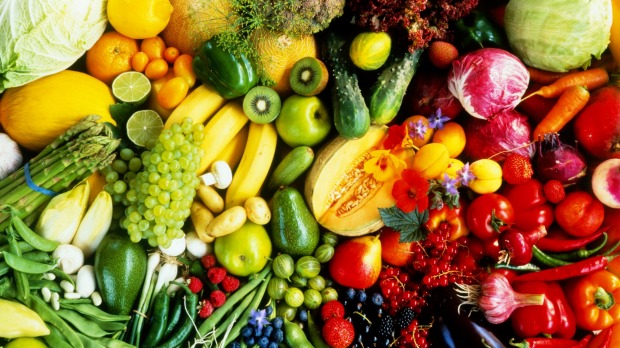Vegetables
 A diet that consists of plenty of vegetables is not only healthy, but may also be beneficial in reducing pain from gout. Doctors have previously advised against vegetables with purines, like mushrooms, asparagus and spinach. However, research published in 2012 claims no correlation between the intake of these vegetables and the risk of developing gout. It is believed that the beneficial elements of these vegetables may offset the effects of the purines in them. Uric acid forms when your body breaks down purines in food and high levels of purines can cause an overproduction of uric acid. Low-purine vegetables can decrease the amount of uric acid in our blood and reduce the risk of crystal formation. Low-purine vegetables typically produce 100 mg or less of uric acid per 100g of food intake. Low-purine vegetables include: beets, potatoes, lettuce, and cucumbers. Each of these vegetables typically produce 50 mg or less of uric acid out of every 100g consumed. A study by the University of Maryland Medical Center suggests that those who suffer from gout eat foods high in antioxidants. Antioxidants protect your body from free radicals, which damage cells and also raise your risk of cardiovascular issues. Red Cabbage is a vegetable that is low in purines but high in antioxidants such as lycopene, vitamin E and beta-carotene. Red peppers fit this description as well; 1 cup of chopped red peppers typically includes 500 mcg of lycopene, 3 mg of vitamin E, and over 1600 mcg of beta-carotene. Vegetables that are high in fiber content are also beneficial for reducing gout. Dietary fiber supports digestion and can slow uptake of nutrients, which helps lower your uric acid level. In 1 cup of chopped raw carrots, there is around 3.5 grams of fiber and carrots are also low in purines. Kale has 2.6g of fiber per cup and raw onions have about 3g of fiber per cup.
A diet that consists of plenty of vegetables is not only healthy, but may also be beneficial in reducing pain from gout. Doctors have previously advised against vegetables with purines, like mushrooms, asparagus and spinach. However, research published in 2012 claims no correlation between the intake of these vegetables and the risk of developing gout. It is believed that the beneficial elements of these vegetables may offset the effects of the purines in them. Uric acid forms when your body breaks down purines in food and high levels of purines can cause an overproduction of uric acid. Low-purine vegetables can decrease the amount of uric acid in our blood and reduce the risk of crystal formation. Low-purine vegetables typically produce 100 mg or less of uric acid per 100g of food intake. Low-purine vegetables include: beets, potatoes, lettuce, and cucumbers. Each of these vegetables typically produce 50 mg or less of uric acid out of every 100g consumed. A study by the University of Maryland Medical Center suggests that those who suffer from gout eat foods high in antioxidants. Antioxidants protect your body from free radicals, which damage cells and also raise your risk of cardiovascular issues. Red Cabbage is a vegetable that is low in purines but high in antioxidants such as lycopene, vitamin E and beta-carotene. Red peppers fit this description as well; 1 cup of chopped red peppers typically includes 500 mcg of lycopene, 3 mg of vitamin E, and over 1600 mcg of beta-carotene. Vegetables that are high in fiber content are also beneficial for reducing gout. Dietary fiber supports digestion and can slow uptake of nutrients, which helps lower your uric acid level. In 1 cup of chopped raw carrots, there is around 3.5 grams of fiber and carrots are also low in purines. Kale has 2.6g of fiber per cup and raw onions have about 3g of fiber per cup.

